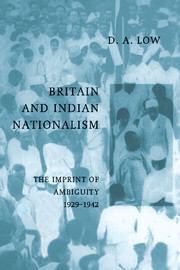Book contents
- Frontmatter
- Contents
- Maps
- Preface
- List of abbreviations
- 1 Introduction: contemporary encounters
- 2 Vortex debate: the purna swaraj decision 1929
- 3 Holds barred: anatomy of a satyagraha, Lucknow, May 1930
- 4 Peace with conflict: the Gandhi–Emerson talks, March–August 1931
- 5 Thrust and parry: the Mahatma at bay, 1932–1933
- 6 Which way ahead? Nehru and Congress strategy 1936–1937
- 7 The spider's web: Congress and provincial office 1937–1939
- 8 Working with the grain: Sir Tej Bahadur Sapru and the antecedents to the Cripps Declaration 1942
- Biographical notes
- Index
7 - The spider's web: Congress and provincial office 1937–1939
Published online by Cambridge University Press: 13 October 2009
- Frontmatter
- Contents
- Maps
- Preface
- List of abbreviations
- 1 Introduction: contemporary encounters
- 2 Vortex debate: the purna swaraj decision 1929
- 3 Holds barred: anatomy of a satyagraha, Lucknow, May 1930
- 4 Peace with conflict: the Gandhi–Emerson talks, March–August 1931
- 5 Thrust and parry: the Mahatma at bay, 1932–1933
- 6 Which way ahead? Nehru and Congress strategy 1936–1937
- 7 The spider's web: Congress and provincial office 1937–1939
- 8 Working with the grain: Sir Tej Bahadur Sapru and the antecedents to the Cripps Declaration 1942
- Biographical notes
- Index
Summary
The British Government know that the Congress is out for complete independence. It seems to me that the British Cabinet resent this attitude … If so, they should plainly tell the world that they will not tolerate complete independence and should cease to play with the word ‘autonomy’. If on the other hand they do not mind national evolution of India to its destiny … they must treat the Congress with consideration …
Gandhi, 6 May 1937For many years I have regarded our position and policy in India as that of fighting a rearguard action. We are deliberately surrendering our power and we ought to do it with good-will; but we must not let the rearguard turn into a rout. There are times when we have to stand and fight, even though at the end of it we continue to retire; and I think we may perhaps before long reach such a stage.
Haig, Governor, UP, to Linlithgow, 4 December 1939If the election campaign and the provincial election results early in 1937 largely resolved the debates within the Congress both over whether it should take the ‘constitutional way’ and over what it should do about establishing its ‘mass contacts’, they served at the same time to bring to a head the third argument running through the years 1935–7 over whether Congress should take provincial office if they won the provincial elections or not.
- Type
- Chapter
- Information
- Britain and Indian NationalismThe Imprint of Amibiguity 1929–1942, pp. 268 - 302Publisher: Cambridge University PressPrint publication year: 1997



